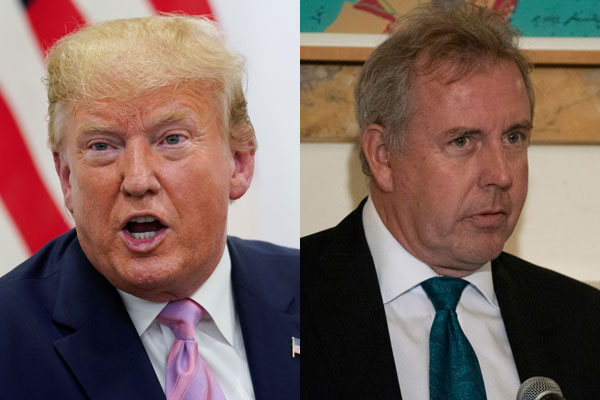UK ambassador pays price for speaking his mind


The 17th century English envoy Henry Wotton is these days known principally for his much overused dictum that "an ambassador is an honest gentleman sent abroad to lie for the good of his country".
What is less known is that his cynical comment on the art of diplomacy, leaked by a political rival, caused outrage and led to his temporary dismissal as a representative abroad of the English monarchy.
Diplomats do not like to think of themselves as serial liars. They like it even less to be penalized for telling what they consider to be the truth.
But that is what happened to Kim Darroch, the UK's ambassador to Washington, who quit following the leak of private cables in which he described President Donald Trump and his administration as "uniquely dysfunctional" and "inept".
The affair might have ended with the leak, published in Britain's Mail on Sunday newspaper, had not Trump decided to turn it into a trans-Atlantic crisis by posting on Twitter:" The wacky Ambassador that the UK foisted upon the United States is not someone we are thrilled with, a very stupid guy."
Trump followed that up with an attack on Prime Minister Theresa May's handling of Brexit negotiations with the European Union.
The next chapter in the evolving drama came when Boris Johnson, May's likely successor as UK prime minister, failed to give his wholehearted support of Darroch in a broadcast interview.
This lack of backing from his potential future boss is perhaps the reason Darroch decided that the best thing he could do was quit. He wrote that "the current situation is making it impossible for me to carry out my role as I would like".
The affair has led to speculation that someone in the hardline Brexit camp might have leaked the offending reports in order to damage a diplomat viewed as too sympathetic to the European Union and too critical of Washington at a time when the UK will be looking for a favorable post-Brexit trade deal with the US. Arch-Brexiteer Nigel Farage said Darroch was totally unsuitable for his post.
The lesson of this sorry saga is that the gentle art of diplomacy is perhaps the latest institution to fall victim to the new pugnacious style of politics evident on the global stage.
Darroch's fellow foreign diplomats in Washington were quick to signal their support for him, saying the views he expressed to London, and intended only for the eyes of his government, were not much different from what they were all saying about their experiences of the Trump administration.
The profession that Darroch and his colleagues pursue has not essentially changed over the centuries. It involves pursuing one's country's interests in a foreign country, whether friend or foe, and frankly reporting home on the situation there.
In line with Winston Churchill's observation that "jaw-jaw is better than war-war", canny diplomats will also attempt to defuse conflict in favor of compromise. That does not mean they are not capable of tough talking if they feel their host country has somehow overstepped the mark.
It is an art that has a venerable history. Chinese diplomats were reaching out to the Persian and Roman empires centuries before the common era.
In recent years, Chinese and international scholars meeting in Beijing concluded that China's diplomats were inspired by the Confucian classics to pursue the country's material interests abroad, while also building lasting, mutually beneficial partnerships with other countries.
From whatever cultural background he or she may come from, that neatly sums up the modern ambassador's job.
Diplomats naturally have to follow the diktats of their political masters, although some will give themselves considerable leeway on how they interpret their brief.
The diaries of Ivan Maisky, the Soviet ambassador to London from 1932 to 1943, which were published posthumously three years ago, reveal how this supremely loyal Russian worked secretly with Churchill and the UK establishment in the 1930s to ensure their countries'cooperation in the coming conflict with Hitler's Germany.
Such freelance activities might be frowned on by today's diplomatic personnel. However, like Maisky, their over-riding ambition is to serve the interests of their country and, in turn, those of their allies.
For Darroch, sadly, that task is now over. Having served in Tokyo and Brussels before reaching the pinnacle of his career in the UK's top diplomatic posting, he is now on the scrap heap - for the time being at least. He has been a victim of political petulance abroad and possible political machinations at home. His fate has sent a chill through professional diplomats who are used to having the full support of their governments.
The irony is that he was forced to quit, not for lying on behalf of his country but for telling the truth, at least as he saw it.

































